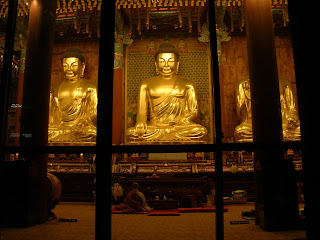Un-zippering my winter coat and turning up the volume on my MP3 player, I am squeezed snugly into a subway car in Sinchon. The people on either side of me are equitably absent from the moment; watching television on tiny personal screens, text messaging friends, vacantly staring straight ahead to avoid eye contact. We touch elbows and hips, bump shoulder bags and smell each other’s dinner-and-soju-breath, but still we make deliberate efforts to maintain the illusions of isolated experience and personal space.
When I first arrived I thought of myself as a traveler in Seoul, rather than as someone who lived here. Every tiny moment shone with the allure of newness, and putting on headphones seemed like forfeiting the opportunity to have an important experience.
Now that I’ve adjusted, the novelty of public transportation in a “foreign” place has worn off and I’ve started to think of my travel routines as mundane. I, too, have fallen comfortably into the Korean habit of ignoring the people just centimeters to my left and right, in favor of rocking out to my own personal soundtrack. It’s only natural that my relationships with the city and its inhabitants have matured and stabilized with time. In some ways, however, I look upon this latest “maturity” with a mournful longing for the feelings of wonder that have passed.
I sometimes feel this way when I look at street signs or advertisements in Korean, too. Less that two years ago, hangeul was little more to me than a strange smattering of circles and squares. Incomprehensible, yes, but romantic and beautiful in a decorative way, as a constant reminder of the distance between my current location and my hometown. I love communicating in Korean now, love knowing more about the culture and the people than I ever did before because of being able to speak this language. That being said, there is still some tiny part of me that misses the feeling of being amazed and intrigued by a place that was once tantalizingly beyond my comprehension.
The cure to this boredom is to shirk thoughts of daily monotony and instead focus upon experiencing every new moment with the same wonder and humble excitement of a newcomer. This isn’t advice for travelers -- it’s advice for life. To fall into habits and feel bored with the routine is natural. It’s easy to succumb to our own restlessness and isolate ourselves from each other, even as we press against one another, elbow to hip, in a city so crowded as Seoul. A better way, though, is to take each habit-worn moment and reframe it as a precious, fleeting opportunity to interact with the people around us.
We may never cross paths again, so what’s the harm in smiling? What’s the harm in laughing when the sway of the subway car sends us crashing into each other? Being familiar with a place or a pattern of life shouldn’t necessarily drain us of all awe. Instead, let us take off our headphones, turn off our personal televisions and engage each other joyfully and gratefully, even as we move about the most routine and uneventful moments in our lives.
(first article for the English-language newspaper at Ewha Women's University)



